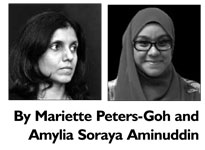 The Court of Appeal, in the recent decision of Airasia Bhd v Rafizah Shima Mohamed Aris,1 ruled on the extent of which the Malaysian Federal Constitution applies in an employment contract between private parties, and the applicability of the Convention on the Elimination of all forms of Discrimination Against Women (CEDAW) in Malaysia. In this article, we analyse the case that has altered the current landscape of women’s rights in the Malaysian workforce. The facts: The appellant, Airasia Bhd, executed a Training Agreement and Bond in October 2006 (the agreement) with its female employee, the respondent. The agreement contained a term prohibiting the respondent from getting pregnant during the training period, which was approximately four years. When the respondent subsequently confirmed her pregnancy before the end of the four-year period, her employment was terminated. The appellant commenced a civil suit at the Sessions Court for breach of the agreement, and a summary judgment was entered against the respondent. On appeal, the respondent filed an action for a declaration that the term in the agreement was illegal, null and void as it discriminated against her as a married woman, and contravened the Federal Constitution as well as the CEDAW. The High Court held in favour of the respondent. Thus, the appellants appealed to the Court of Appeal. The issues: The issues before the Court of Appeal were, firstly, whether the agreement discriminated against women and contravened the Federal Constitution and the CEDAW; and secondly, whether the CEDAW has any force of law in Malaysia. |
Article 2
States Parties condemn discrimination against women in all its forms, agree to pursue by all appropriate means and without delay a policy of eliminating discrimination against women…:
Article 8 – Equality
(2) Except as expressly authorised by this Constitution, there shall be no discrimination against citizens on the ground only of religion, race, descent, place of birth or gender in any law or in the appointment to any office or employment under a public authority or in the administration of any law relating to the acquisition, holding or disposition of property or the establishing or carrying on of any trade, business, profession, vocation or employment.
The decision: In allowing the appeal, it was held that as a branch of public law, constitutional law concerns only the contravention of an individual’s rights by a public authority, and, therefore, did not apply to the agreement in question, which was a lawful contract between private parties.
Additionally, while Malaysia is a signatory to the CEDAW, without express incorporation into domestic law or local legislation, the provisions of international obligations in the said convention did not have any binding effect. Furthermore, the agreement did not restrain or prohibit marriage or pregnancy if the respondent completed the said training programme accordingly. Therefore, the agreement did not discriminate against women.
The implications: This decision, which ruled on the non-application of the CEDAW in Malaysia, effectively distinguishes the views adopted in the highly applauded case of Noorfadilla Ahmad Saikin v Chayed Basirun & Ors.2 In that case, the High Court judge, who referred to the CEDAW to clarify the meaning of ‘equality’ and ‘gender discrimination’, ruled that it has the force of law and is binding on members states, including Malaysia, which ratified the CEDAW in 1995.
Whilst the Court of Appeal in this case is not bound by judicial precedent to follow a decision emanated from the High Court, this recent decision appears to have cast a doubt on the legal status of women in the Malaysian workforce.
Conclusion: Notwithstanding the above, in line with Malaysia’s standpoint to promote gender equality and more importantly, to eliminate all forms of discrimination against women, this decision may in fact act as a catalyst for the Government to take all the necessary steps to incorporate the CEDAW into domestic law or local legislation.
Endnotes
- [2015] 2 CLJ 510
- [2012] 1 CLJ 769
ZUL RAFIQUE & partners
D3-3-8 Solaris Dutamas, No 1 Jalan Dutamas 1
50480 Kuala Lumpur, Malaysia
Tel: (60) 3 6209 8228 / Fax: (60) 3 6209 8221
Email:
mariette.peters@zulrafique.com.my
amylia.soraya@zulrafique.com.my
Website: www.zulrafique.com.my

